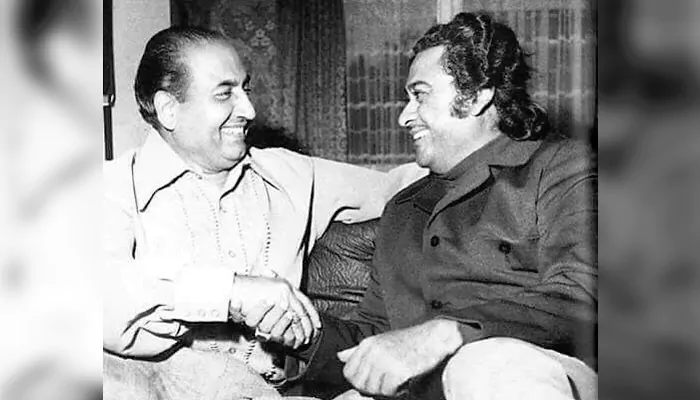
Why is no one making a film on this story?
Long before social media turned every difference into a debate, fans of Hindi film music were already caught in one of the greatest showdowns: Rafi vs Kishore. Were you a Rafi admirer or a Kishore fan? The camps were firmly divided, and the narrative of rivalry was fed for decades through magazine columns, radio banter, and drawing-room discussions. But behind all the noise, the reality was far simpler, and far more beautiful. “My dad and Rafi uncle had the highest regard for each other,” Amit Kumar once said, reflecting on the friendship that existed away from the spotlight. Shahid Rafi, Mohammed Rafi's son, said in an interview, “They were really good friends. Kishore Da used to respect my father a lot.” They may have had contrasting styles (Rafi with his classical finesse and Kishore with his spontaneous charm), but there was never really a war.
However, there was one instance when the two legends unknowingly found themselves in a rare musical face-off. Today, that accidental challenge is remembered as one of the most iconic moments in Hindi film music history. As we remember Rafi on his death anniversary, let's learn that story.
By the late 1960s, Mohammed Rafi had already earned his place in the pantheon of Hindi cinema. His voice had become the soul of countless silver-screen heroes, creating magic in song after song. But 1969 changed everything. A new voice took center stage, riding the wave of youth.
Kishore Kumar wasn’t new to playback singing. But when R.D. Burman’s soundtrack for 'Aradhana' exploded, Kishore's renditions of “Mere Sapno Ki Rani,” “Roop Tera Mastana,” and “Kora Kagaz Tha Yeh Man Mera” seemed to capture the zeitgeist. The industry pivoted, and Rafi, once the unchallenged monarch of melody, felt the shift.
That moment hit home late one night. In the 2017 documentary Dastaan‑E‑Rafi, actor Rohan Kapoor recounts a call that his father, singer Mahendra Kapoor, received from a troubled Rafi. “Rafi saab called up my father and said, ‘Mahendra, yaar bada udaas ho gaya hoon main…’”, he said.
“ bane chahe dushman
— Film History Pics (@FilmHistoryPic) February 5, 2022
zamana humaraa ,
salaamat rahe dostana humaara..”
Mohd Rafi and Kishore Kumar pic.twitter.com/onZQplvJ2j
(Credit: Film History Pics)
He added that producers who once lined up outside his door now passed him by without a second glance. “Have I become a bad singer?” Rafi had asked. Mahendra Kapoor tried to comfort him. But it wasn’t about skill; it never had been. The winds of showbiz shift without warning, as new tastes emerge and new stars rise. But Rafi’s vulnerability in that moment showed that even the greatest voices aren’t immune to silence.
At the heart of this emotional whirlpool was a film, 'Pyaar Ka Mausam', and a song that would become a landmark in playback history. R.D. Burman, who had become the new sound of Bollywood, made an unusual decision: he recorded the same song twice, with two different singers. One version would be rendered by Kishore Kumar, the other by Mohammed Rafi.
It wasn’t a stunt; rather, the story required it. Kishore voiced the father, played by Bharat Bhushan, and Rafi sang for the romantic hero, Shashi Kapoor. The song was “Tum Bin Jaun Kahaan”, a melodic expression of longing and love.
But what could have become a musical duel turned into something more meaningful. Rafi’s version carried his trademark finesse, while Kishore’s take bore his unique emotional stamp, even slipping in a yodel that only he could pull off without breaking the mood.
Audiences embraced both. In fact, Rafi’s version gained a slight edge in popularity, reminding everyone that his artistry still had a powerful hold. But perhaps more importantly, the song showed that their voices could exist side by side, not in conflict, but in conversation.
“ tum bin jaaoon kahaan
— Film History Pics (@FilmHistoryPic) November 19, 2020
ke duniya mein aa ke ,
kuch naa phir chaaha kabhi
tumko chaah ke .. “
sung by both Mohd Rafi & Kishore Kumar
(1969) ‘Pyar Ka Mausam’ pic.twitter.com/Bjk0vqRrJi
(Credit: Film History Pics)
Four versions were recorded in total, two each by Rafi and Kishore. And while fans loved to debate which one was better, the truth was that both singers brought something only they could offer. Together, they elevated the song beyond rivalry.
(Credit: Saregama Music)
(Credit: Saregama Music)
For decades, fans and tabloids have tried to frame the Rafi-Kishore relationship as a battle of egos. But those who knew them tell a different story. Behind the scenes, there were no sharp words or silent grudges. They were just two legends navigating the unpredictability of fame, supporting each other when the spotlight shifted. They shared studio time, laughs, and even advice. And when Rafi passed away in 1980, it was Kishore Kumar who stood at the funeral, bidding farewell like a true friend.
And you know, when giants walk the same road, they create something timeless.